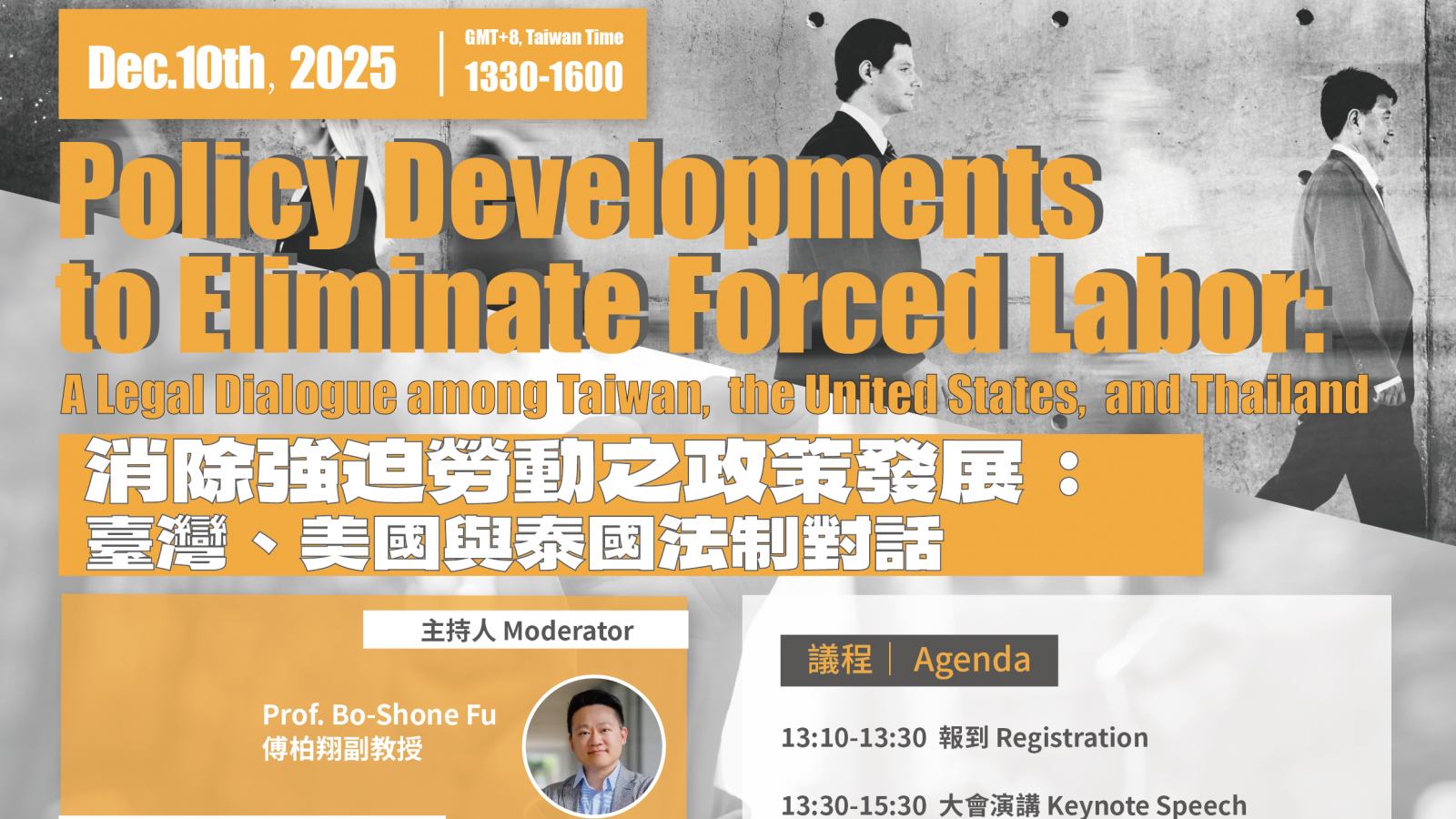

側記 翻譯作為公共歷史:一個東亞史的研究路徑
2022-06-27
Translation in East Asian History as Public History
時間:2022-05-27, 10:00-12:00
主持人:謝一誼
與談人:Sarah Chang, Craig Smith
側記:戴愷如 Elizabeth Ditmanson
This forum was convened to create a dialogue around translation as a form of public knowledge and knowledge production. The forum’s three speakers come to translation as scholars in history and anthropology working with primary sources, and each discussed their own approaches and experiences doing translation work. Recurring themes in the discussion were questions of how translation functions in relation to public history, and how to evaluate the decolonizing potential of translation work. Sarah Chang is a translator and PhD candidate in Modern Chinese History at the University of California. Her dissertation is titled “The Life and Death of the Socialist Factory: Spatial Politics and the Factory Life in China, 1958 to the Present.” Craig Smith is a senior lecturer in translation studies at the University of Melbourne Asia Institute. He has a PhD in East Asian History from the University of British Columbia, and has authored the book Chinese Asianism: 1894-1945 (Harvard University Asia Center, 2021). He also co-edited Translating the Occupation: The Japanese Invasion of China, 1931-45 (UBC Press, 2021). Jonathan Henshaw is also a co-editor of the same volume, and was unable to attend as a planned speaker due to illness. Acting as moderator of the forum, I-Yi Hsieh has a PhD in East Asian Studies from New York University, and an M.A. in Anthropology from The New School for Social Research in New York. In 2019 her translation and commentary on Huang Wenshan’s work entitled “Huang Wenshan and His Cosmopolitan Culturology: Correspondence of Huang Wenshan” was published in the journal positions: asia critique.
Sarah Chang’s presentation masterfully brought together the social, political, and personal dimensions of translation work in articulating the significance of translation as both a lived experience and as a political tool for bridging fields of knowledge production. Growing up in the People’s Republic of China before moving to the United States as a teen, Chang sees her translation work and scholarly identity as influenced by her upbringing as the daughter of working-class immigrant parents in the US. Sharing experiences of learning to and being required to translate for her family from a young age, Chang’s presentation brought poignant light to the both acutely bodily and politically charged nature of her role as translator in her own personal life. Speaking about her visceral, sensory memories of the bodily experience of acting as translator, Chang recalled that everyday translation spans not only over the technicalities of language, but also expectations of how to speak, act, dress, or eat. She put into words not only the ways in which translation spans across multiple facets of bodily experience, but also how often this embodied process of translation and interpretation is crucial to navigating the power and political dynamics of class and racial mediation.
Chang opened her talk with her definitions of the terms “imperial,” and “colonial,” and “Chinese.” She sees Empire as an infinitely subsuming global order whose current form emerged with the crumbling of the Cold War system, and in which much of the world is currently engaged. On the other hand, colonialism is more of a single state practice of military and economic domination that is also characterized by the terrorization of indigenous communities. For Chang, “Chinese” refers to individuals who self-identify as ethnic Han, as part of a Chinese diasporic community, or individuals from the People’s Republic of China. These definitions became particularly important to Chang’s talk when discussing the figure of the translator and its politicization at professional and personal levels, particularly as tensions persist in US-China relations. Chang noted that the term zhiren (殖人), “the colonized person,” has emerged in Chinese online spaces to refer to Chinese individuals, particularly those who live outside of the People’s Republic of China, who are thought to have been overly influenced by Western ideology. Chang emphasized the development of this phrase as a term of insult used to delegitimize the opinions and experiences of groups of people, particularly those living as diasporic Chinese. This is an especially difficult and relevant issue for those doing the work of translation, who often face suspicion and accusations about intention from both sides of the language and geographical divide.
In the final part of Chang’s talk, she addressed the crucial role played by translators and academics working both in the US and China to work through the enmity and antagonism in current US-PRC relations. She pointed out that leftist scholars in China work to understand China’s current capitalist status in relation to a socialist past, while also working around, against, through Western discourse about this topic. Referencing Wendy Brown’s Walled States, Waning Sovereignty (Zone Books, 2010), Chang discussed the increasingly antagonistic and xenophobic language of walls, barriers, and borders that has come to dominate public political relations discourse of “the other” in both the US and PRC. She emphasized, however, that in reality, the relationship between these two nation-states is still quite porous. There are close economic ties between the two countries, and also remarkable similarities between the two governments’ handling of crises. Chang’s work in both mapping out Chinese intellectual history in the English language, and also in collaborative translation, strives to countermeasure antagonistic and binary language patterns. She sees the international collaboration between scholars in translation groups like history labs based in the University of British Columbia, as a crucial way of building structures and bridges to fight hegemonic antagonism and create spaces of solidarity for those struggling in and against this constructed dichotomy.
Following Sarah Chang’s talk, Dr. Smith’s presentation focused on sharing his career experiences as a historian translating primary sources who has gradually moved into translation history and pedagogy. His discussion was framed by principles from Michel-Rolph Trouillot’s book Silencing the Past: Power and the Production of History (Beacon Press, 2015), which explores the process of multi-dimensional silencing that occurs in the making of historical narratives. Dividing the process of producing history into sources, archives, and narratives, Trouillot’s work serves as important guidance in questioning ways that information is generated, accessed, and narrativized, and thus helps to highlight the moral obligation for scholars to identify and respond to perspectives that have been previously silenced by the historical record, and to make translations of primary sources available. Informed by this awareness of the need for translation as part of the process of decolonization, Dr. Smith’s talk discussed some of the practical considerations, challenges, and goals of his translation work and translation teaching.
Smith suggested three important approaches for incorporating translation into historical studies. The first is integrating primary sources translation with historical scholarship. Dr. Smith pointed out that translation work often still faces lack of funding support from many academic institutions. Combining the translation of primary sources with historical writings both serves to provide important historical context to translations, and also sometimes provides a method of securing project funding. Second, Dr. Smith raised the importance of involving graduate students in translating projects. He outlined the different types of projects he assigns his students at the University of Melbourne, and stressed that giving students opportunities to translate academic works, rather than repetitive exercises, enriches both the students’ experience and abilities, and mostly yields good results. Dr. Smith explained that many of his students’ translation projects are copyedited and put online, with some students translating professional articles from the Melbourne Asia Review journal associated with their institute. Finally, Dr. Smith briefly discussed his work in his book Chinese Asianism. With reference to Lydia Liu, he emphasized the significance of the history of translation in understanding the formation of concepts of region and nation in China. Smith pointed out that the struggles in translation work and dissemination often mirror struggles against hegemonic powers, a current example being Taiwanese media coverage of the war in Ukraine as translations of American CNN coverage, rather than accounts directly translated from Ukrainian or Russian sources. Dr. Smith concluded by stressing that translation is a valuable tool, and imperative to efforts to un-silencing the many silenced parts of history.
Finally, Dr. Hsieh’s presentation centered around her work on 20th century scholar Huang Wenshan (黃文山, 1897-1982). Huang represented the anarchist wing of Chiang Kai-shek’s Chinese Nationalist Party (Kuomingtang國民黨, KMT), and was an important figure in the early development of anthropology in China. With a highly mobile, diasporic life spread across China, Taiwan and the US, Huang Wenshan eventually worked in the leftist New School in New York during the 1950s. Dr. Hsieh’s translation of and commentary on Huang’s work focuses on the development of his interest in culture and culturology (文化學) against the backdrop of the Second Sino-Japanese War. In particular, Dr. Hsieh’s work translates and understands Huang’s life and scholarship through his account of his relationship with another May Fourth anarchist scholar Wu Zhihui (吳稚暉). In her discussion, Hsieh showed how the correspondence between these two men is emblematic of both the crisis Kuomingtang anarchists found themselves in when faced with both domestic and international war in the 1930s and 1940s, and the ensuing cultural turn amongst this group of scholars. Hsieh understands this turn toward cultural cosmopolitanism to be influenced by hopes for peace and non-political solutions for war in a times of significant conflict.
Dr. Hsieh also discussed the fact the significance of her translation work on this project was expanded by unexpected messages she received after publication. The first was from Huang Wenshan’s daughter-in-law, who found Dr. Hsieh’s article through internet searches, and communicated to Dr. Hsieh that she was finally able to share Huang’s story with his own grandchildren. Another connection arising from this publication was with Mark Larrimore at the New School for Social Research in New York. Larrimore had found a syllabus of Huang’s, and was able to piece together details of Huang’s life from Dr. Hsieh’s translation. To close, Dr. Hsieh showed a New School Bulletin cover from 1951, in which a concurrent talk “What Price A United States-China War?” was advertised alongside Huang Wensha’s courses. Particularly with the ringing relevance of this lecture title to today’s political climate, Dr. Hsieh concluded with the point that these inter-personal and political connections highlight the crucial importance of translation in creating meaning beyond the bounds of the author or the translator, and as generation of public texts.
Following the individual presentations, the forum was opened to discussion with panelists and audience. Responding to Dr. Smith’s mention of the potential disruption of training courses and academic exchange programs in translation and cultural studies courses, Sarah Chang brought up her sense of tectonic shifts in the field of Chinese Studies in the West. She made the point that some online collaborations have still been possible in recent years, but that in her experience, some projects have been halted due to the combination of COVID-19 and tense US-China political tensions. As this is an ongoing issue, Chang was particularly interested to hear any other audience feedback or responses to this particular question.
One important topic in the forum discussion was the importance of collaborative work as an inherent part of translation practices. This topic appeared in different forms across each of the speakers’ presentations, and was brought forward by Dr. Hsieh for further discussion after individual presentations. Working within a translation collective, Sarah Chang mentioned that her translation work is primarily a collaborative practice, usually working together with her translation partner Nathan Gan on individual texts. Adding on to a point from his presentation, Dr. Smith elaborated that, historically speaking, translation has often been collaborative work, mentioning examples like James Legge and Wang Tao (王韜), Yang Xianyi (楊憲益) and Gladys Yang. Dr. Hsieh explained that her connections to the event’s speakers themselves were largely born out of collaborative translation projects, and that her current work translating Gail Hershatter’s Women and China’s Revolutions (Rowman & Littlefield, 2018) into Chinese is also a collaborative process, requiring constant and thorough discussion.
One audience member raised a question for Dr. Smith about whether there are developed methodologies or cultural practices related to translating the materials of indigenous people. Dr. Smith mentioned that his experience translating indigenous texts is limited, but emphasized that it is crucial to ask for help and establish dialogue with the community of people whose texts are being translated themselves. He talked about the fact that translation work involving multiple languages, like the subtitling for the television series Sequalu (《斯卡羅》), can create challenges in requiring multiple sets of specialized vocabulary. Returning to themes from earlier parts of the discussion, Smith emphasized that lots of communication is crucial to the success of these types of translation projects. Following up, Dr. Hsieh made the point that the knowledge production involved in translation spans across not only historical and academic texts but also in the translation of literature or public arts-related texts. Dr. Smith mentioned that the Taiwan government is currently providing much support for translation, allowing scholars to choose what types of projects they want to tackle.
Finally, Dr. Smith also brought up the fact that in the past, translation has often been dominated by American military bodies and projects. Dr. Hsieh also pointed out that this is also true of translation projects by Japanese colonizers and KMT efforts in Taiwan, emphasizing that this political dimension has also always been present across the history of translation.
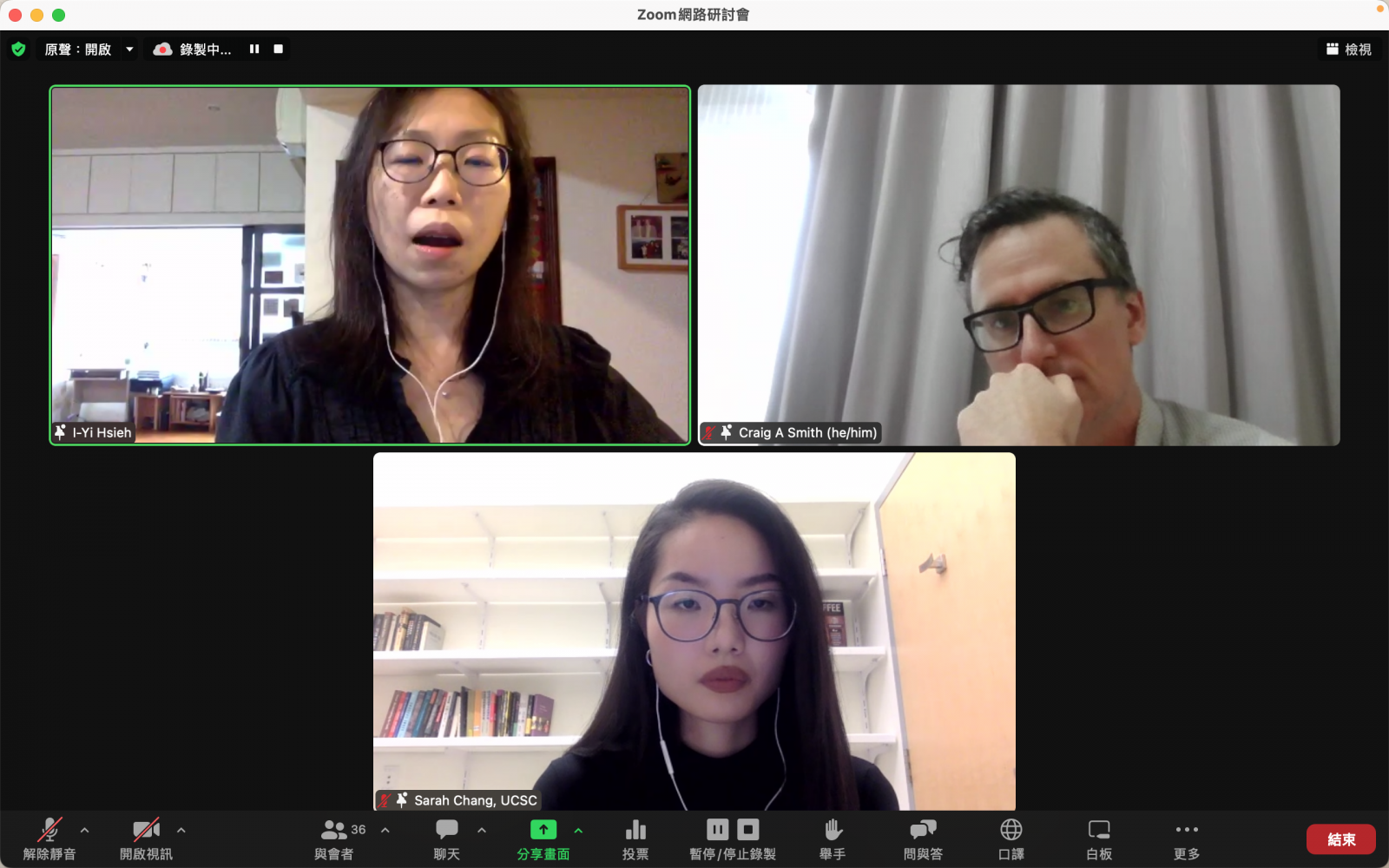
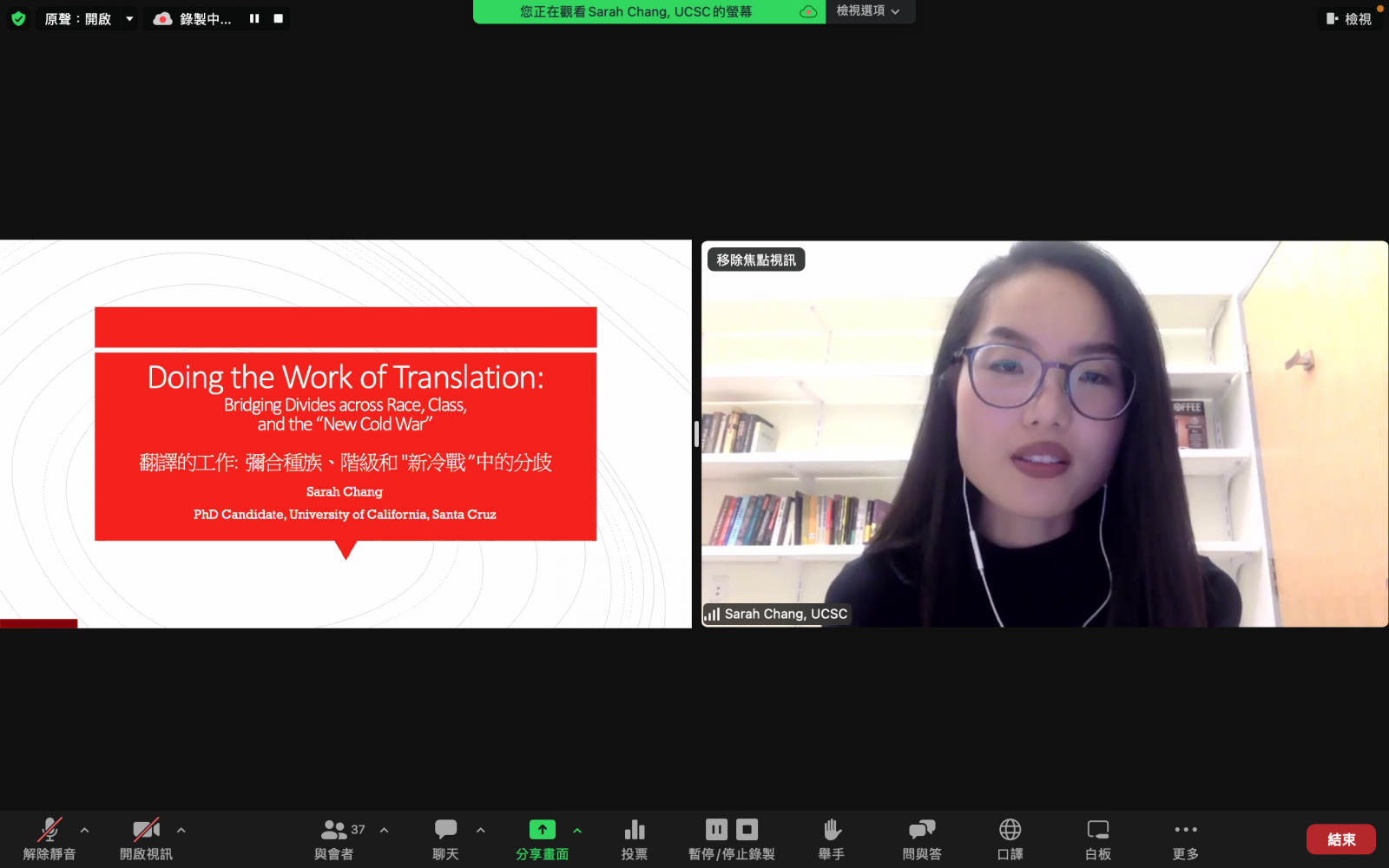
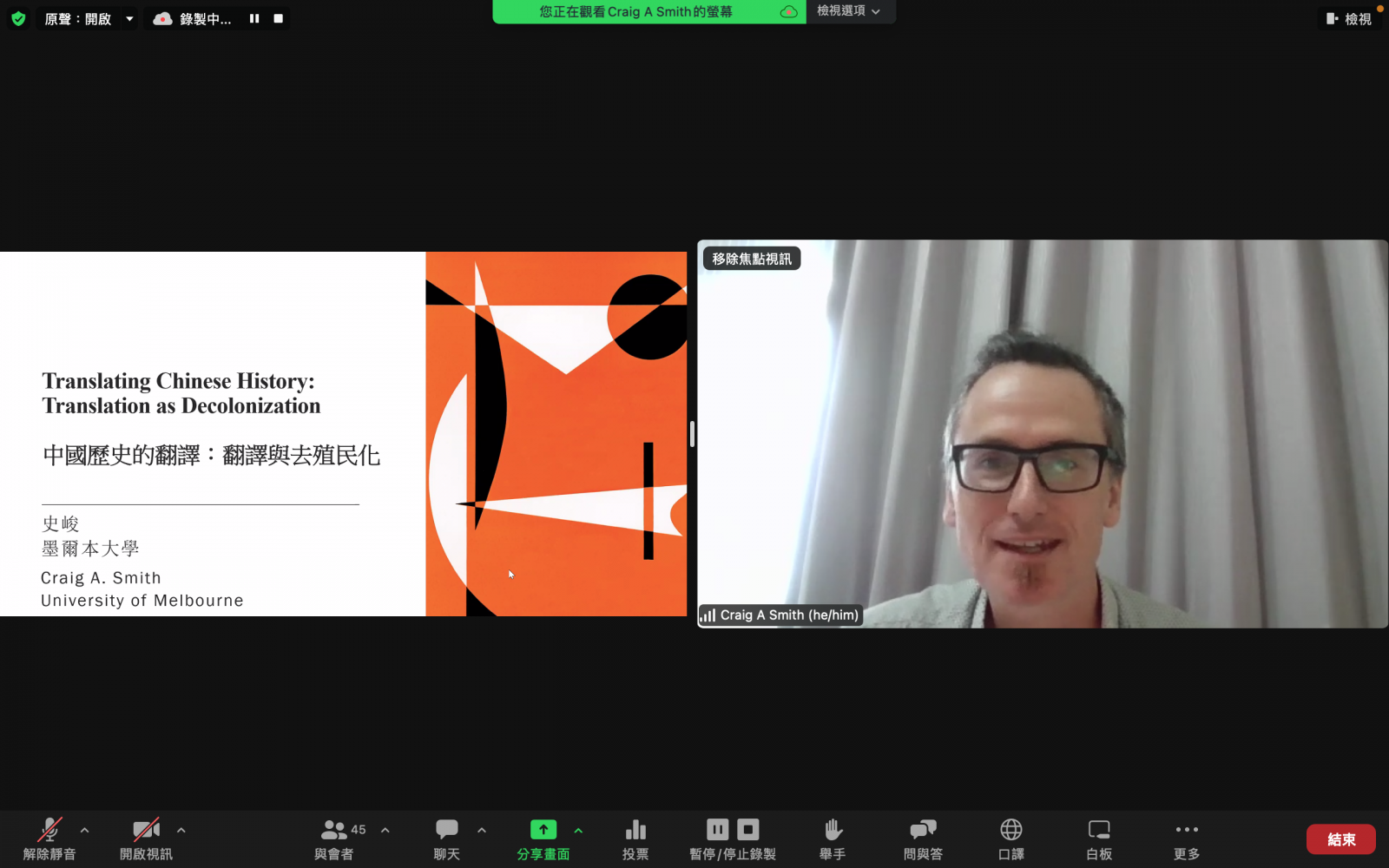
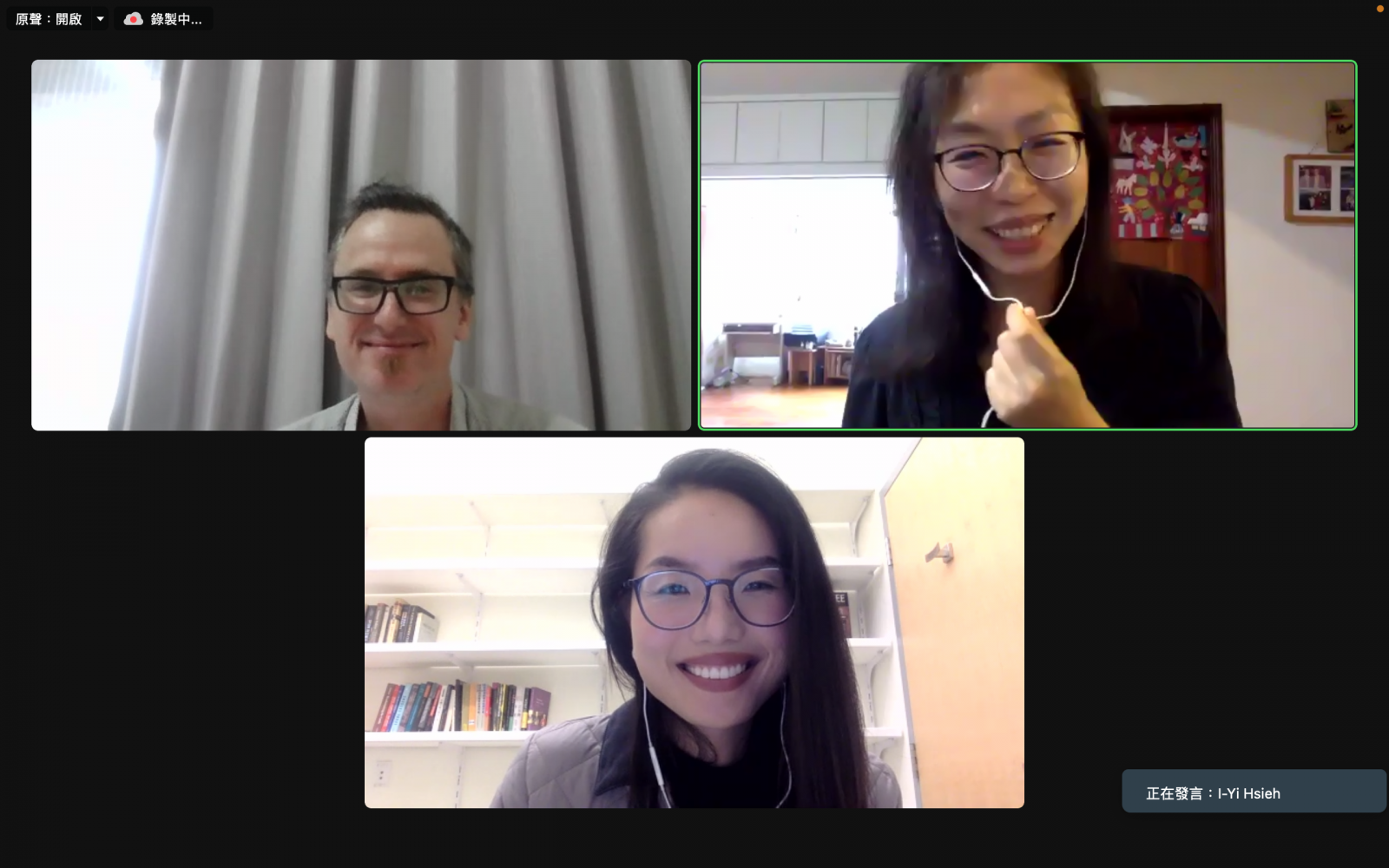
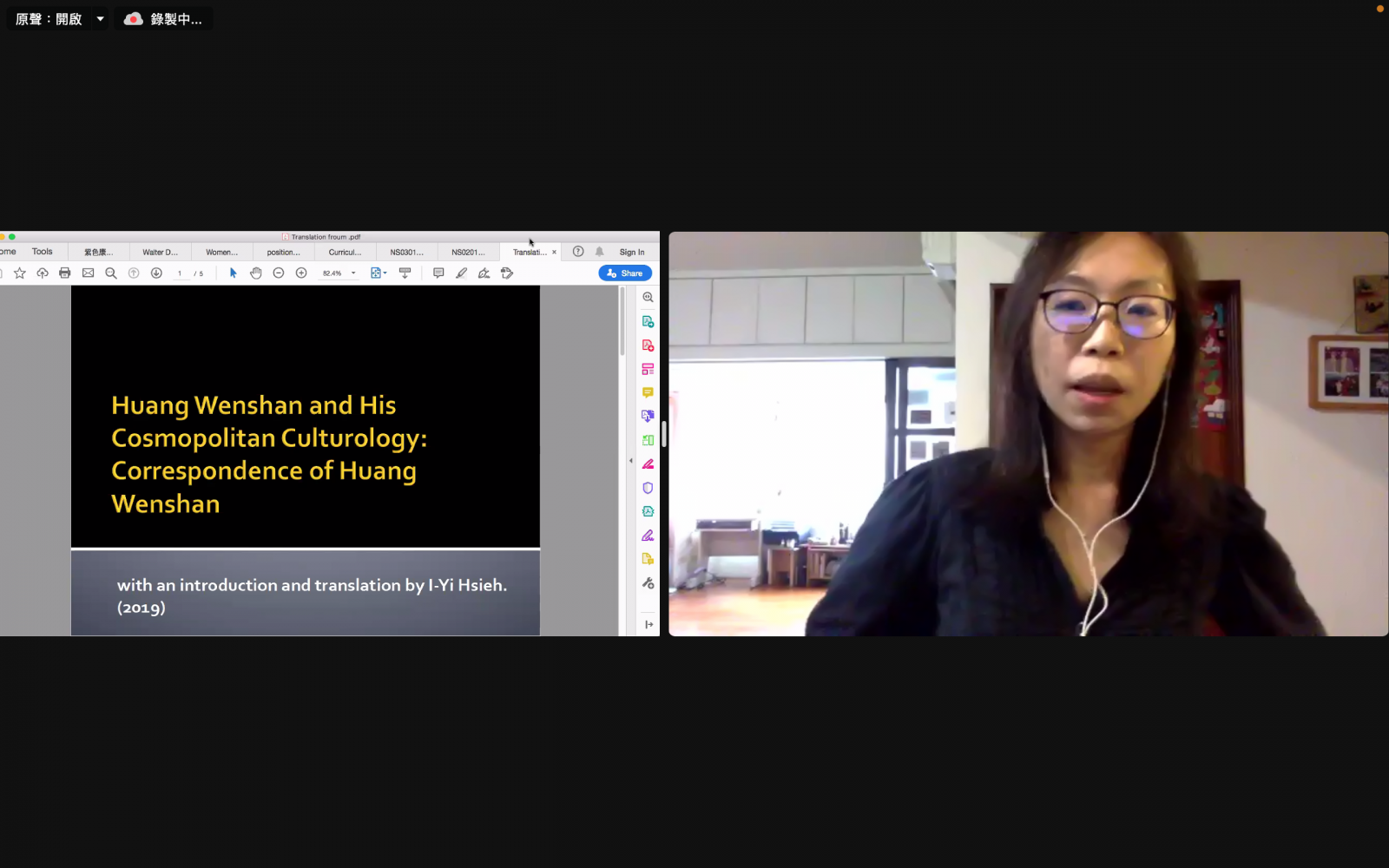
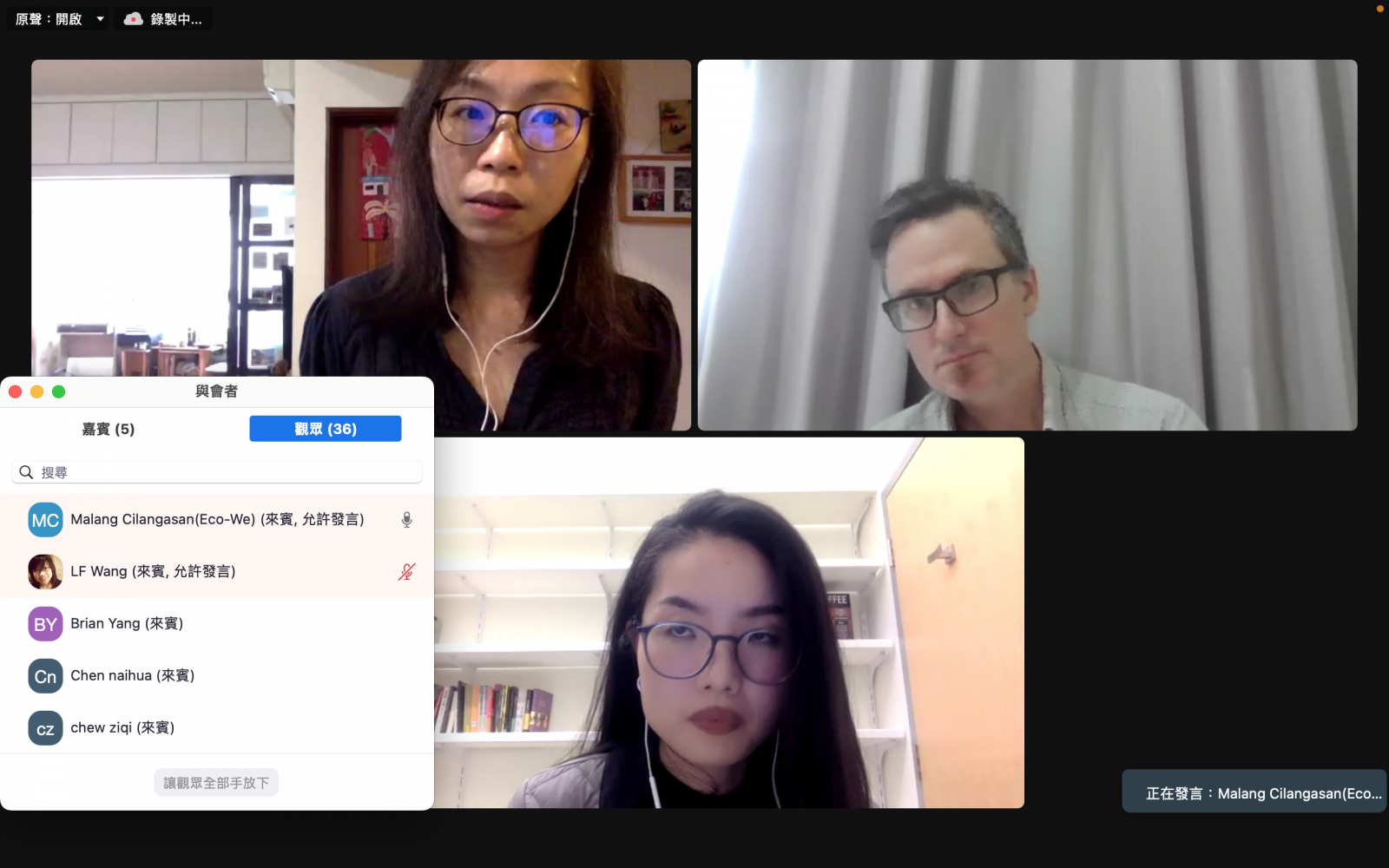
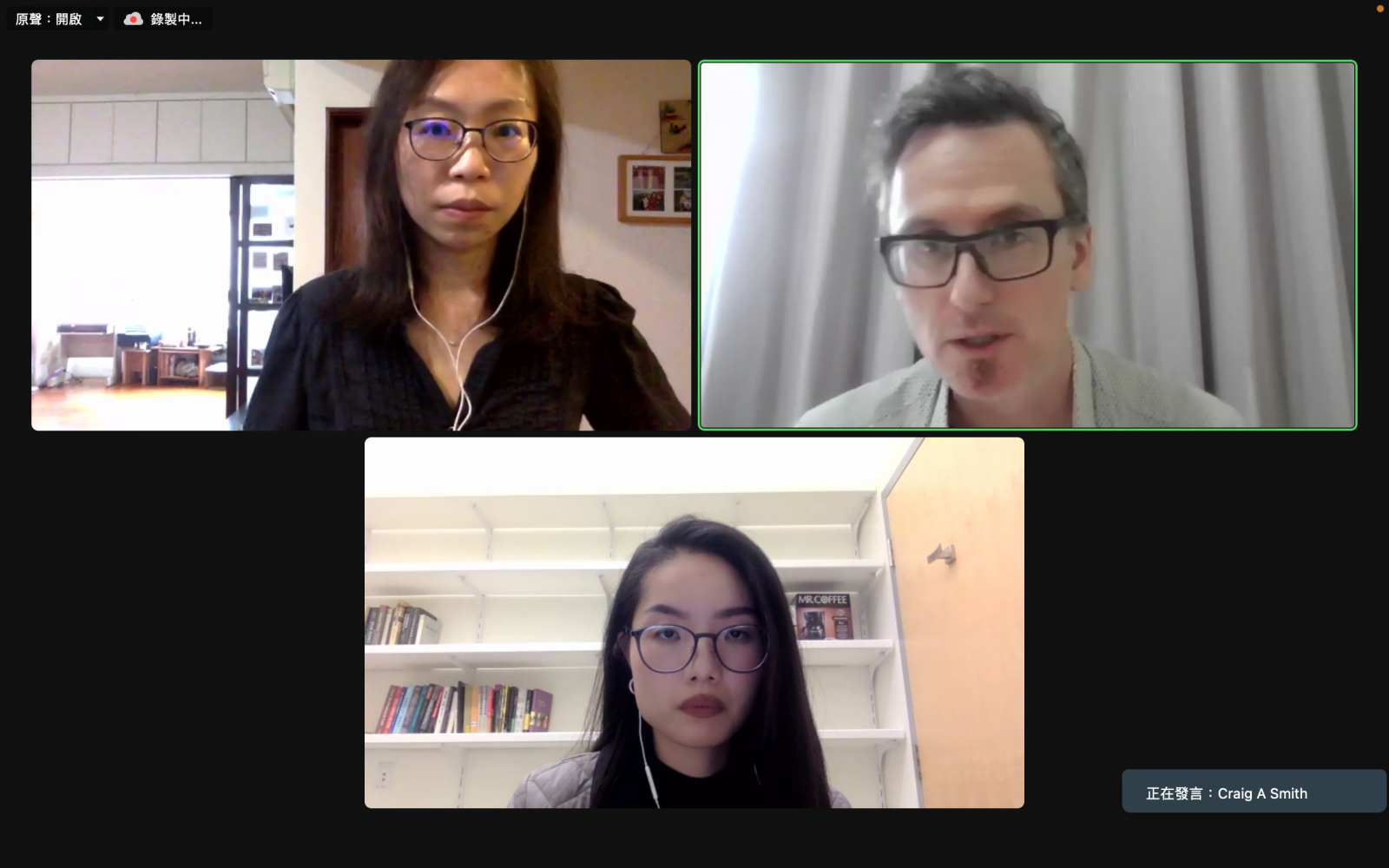
近期新聞 Recent News

